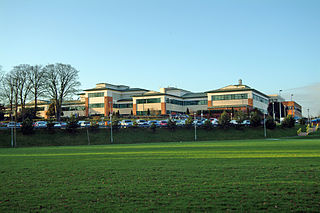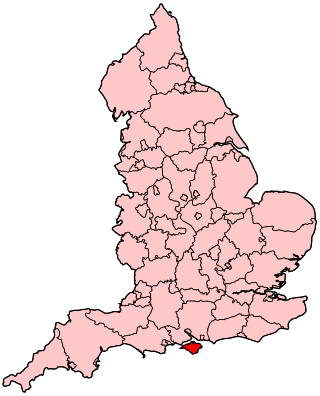Strategic health authorities (SHA) were part of the structure of the National Health Service in England between 2002 and 2013. Each SHA was responsible for managing performance, enacting directives and implementing health policy as required by the Department of Health at a regional level.
Cambridge University Hospitals NHS Foundation Trust is a British public sector healthcare provider located in Cambridge, England. It was established on 4 November 1992 as Addenbrooke's National Health Service Trust, and authorised as an NHS foundation trust under its current name on 1 July 2004.

Primary care trusts (PCTs) were part of the National Health Service in England from 2001 to 2013. PCTs were largely administrative bodies, responsible for commissioning primary, community and secondary health services from providers. Until 31 May 2011, they also provided community health services directly. Collectively PCTs were responsible for spending around 80 per cent of the total NHS budget. Primary care trusts were abolished on 31 March 2013 as part of the Health and Social Care Act 2012, with their work taken over by clinical commissioning groups.
Health and Social Care (HSC) is the publicly funded healthcare system in Northern Ireland. Although having been created separately to the National Health Service (NHS), it is nonetheless considered a part of the overall national health service in the United Kingdom. The Northern Ireland Executive through its Department of Health is responsible for its funding, while the Public Health Agency is the executive agency responsible for the provision of public health and social care services across Northern Ireland. It is free of charge to all citizens of Northern Ireland and the rest of the United Kingdom.

Sir David Nicholson is a public policy analyst and NHS Manager who is the Chair of Sandwell and West Birmingham Hospitals NHS Trust and Chair of Worcestershire Acute Hospitals NHS Trust. He was previously the Chief Executive of the National Health Service in England. He was appointed in October 2011 following the NHS reforms, having been seventh Chief executive of the NHS within the Department of Health since September 2006. He issued what has become known as the "Nicholson challenge" regarding the finances of the NHS. He retired from the role on 1 April 2014 in the wake of the Stafford Hospital scandal.

The East of England Ambulance Service NHS Trust (EEAST) is an NHS trust responsible for providing National Health Service (NHS) ambulance services in the counties of Bedfordshire, Cambridgeshire, Essex, Hertfordshire, Norfolk and Suffolk, in the East of England region. These consist of approximately 6.2 million people across an area of 7,500 square miles (19,000 km2).
The Health and Social Care Select Committee is a Departmental Select Committee of the British House of Commons, the lower house of the United Kingdom Parliament. Its remit is to examine the policy, administration and expenditure of the Department of Health and Social Care (DHSC) and its associated agencies and public bodies. The Clerks of the Committee are Previn Desai and Joanna Dodd.

Emergency medical services in the United Kingdom provide emergency care to people with acute illness or injury and are predominantly provided free at the point of use by the four National Health Services (NHS) of England, Scotland, Wales, and Northern Ireland. Emergency care including ambulance and emergency department treatment is only free to UK residents and a charge may be made to those not entitled to free NHS care.

The National Health Service (NHS) is the publicly funded healthcare system in England, and one of the four National Health Service systems in the United Kingdom. It is the second largest single-payer healthcare system in the world after the Brazilian Sistema Único de Saúde. Primarily funded by the government from general taxation, and overseen by the Department of Health and Social Care, the NHS provides healthcare to all legal English residents and residents from other regions of the UK, with most services free at the point of use for most people. The NHS also conducts research through the National Institute for Health and Care Research (NIHR).
The Care Quality Commission (CQC) is an executive non-departmental public body of the Department of Health and Social Care of the United Kingdom. It was established in 2009 to regulate and inspect health and social care providers in England.

East Lancashire Hospitals NHS Trust is an NHS hospital trust in Lancashire, England. It was established on 1 September 2002, as the result of a locally controversial, cost saving merger of Blackburn Hyndburn & Ribble Valley NHS Trust and Burnley Health Care NHS Trust, first announced in September 1999.
Medway NHS Trust is an NHS foundation trust based in Kent which runs Medway Maritime Hospital.

The Stafford Hospital scandal concerns poor care and high mortality rates amongst patients at the Stafford Hospital, Stafford, England, during the first decade of the 21st century. The hospital was run by the Mid Staffordshire NHS Foundation Trust, and supervised by the West Midlands Strategic Health Authority. It has been renamed County Hospital. The scandal also resulted in the resignation of NHS Chief Sir David Nicholson in 2013.
Croydon PCT was the primary care trust with responsibility for the London Borough of Croydon, which covered parts of south west London and north Surrey. It was responsible for planning and funding healthcare, and for public health in Croydon. It was accountable to NHS London, the strategic health authority for London.

County Hospital is an acute hospital with less than 200 inpatient beds, opened in 1983. It is the main hospital in Stafford, England. The hospital is managed by University Hospitals of North Midlands NHS Trust. County Hospital's Accident and Emergency unit is the only such facility in Stafford. Wards at County Hospital are numbered, with the exception of specialist units. The hospital changed its name on 1 November 2014 from Stafford Hospital to County Hospital as part of the dissolution of the Mid Staffordshire NHS Trust.

Hinchingbrooke Hospital is a small district general hospital in Hinchingbrooke near Huntingdon, Cambridgeshire. Opened in 1983, it serves the Huntingdonshire area, and has a range of specialities as well as an emergency department and a maternity unit. The hospital is managed by the North West Anglia NHS Foundation Trust.

The Health and Social Care Act 2012 is an act of the Parliament of the United Kingdom. It provided for the most extensive reorganisation of the structure of the National Health Service in England to date. It removed responsibility for the health of citizens from the Secretary of State for Health, which the post had carried since the inception of the NHS in 1948. It abolished primary care trusts (PCTs) and strategic health authorities (SHAs) and transferred between £60 billion and £80 billion of "commissioning", or healthcare funds, from the abolished PCTs to several hundred clinical commissioning groups, partly run by the general practitioners (GPs) in England. A new executive agency of the Department of Health, Public Health England, was established under the act on 1 April 2013.

The Isle of Wight NHS Trust is an NHS trust which provides physical health, mental health and ambulance services for the Isle of Wight. The trust is unique in being the only integrated acute, community, mental health and ambulance health care provider in England. It runs St Mary's Hospital and the Isle of Wight Ambulance Service.
Frimley Health NHS Foundation Trust is an NHS Foundation Trust created on 1 October 2014 by the acquisition of Heatherwood and Wexham Park Hospitals NHS Foundation Trust by Frimley Park Hospital NHS Foundation Trust. This was the first ever take over of one NHS Foundation Trust by another. It runs Heatherwood Hospital in Ascot, Wexham Park Hospital near Slough, both in Berkshire, and Frimley Park Hospital near Camberley, Surrey.
Healthcare in London, which consumes about a fifth of the NHS budget in England, is in many respects distinct from that in the rest of the United Kingdom, or England.










